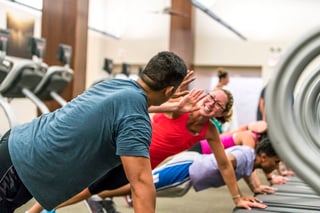MAKE A SPLASH
THIS SUMMER

Join Now For $0 Enrollment!
Learn MorePosted By: Sasha DeJaynes /
We all know that exercise is essential for your overall health, but in addition to all of the physical benefits it offers, there are also a plethora of ways in which working out improves your brain function, cognitive abilities and can help ward off debilitating mental diseases like Altheimer's. After all, whole health includes a healthy body and a healthy mind. Read on to learn about how the simple addition of 45 minutes a day of physical exercise can help improve your brain.
 Get that blood pumping!
Get that blood pumping!Blood courses through our bodies, and is truly the elixir of life. It is the means by which nutrients and essential elements such as oxygen are transported throughout our bodies to all of our vital organs, and especially to our brains. Exercise, both cardiovascular and strength training, help to increase blood flow, ensuring that those vital nutrients and elements make their way to all the places they are needed. And it doesn't need to be rigorous. The simple act of walking is enough to create the impact needed to increase "cerebral flow", or blood flow to the brain, allow your brain the important elements it needs to create new cells, blood vessels and neurons. More vigorous activity results in more active blood flow, but just a little can go a long way.
 Come on, get happy!
Come on, get happy!Physical activity helps our body to release endorphins, neurotransmitters that pass along feelings of pleasure and euphoria along neurons throughout our body, which is why people who love running often refer to experiencing a "runner's high". The fact is that these endorphins help to reduce stress and enhance our mood. Besides the physical benefits that reduced stress has on our body, feeling good and being in a good mood allow our brains to operate more efficiently. We think clearer, stay more focused and are generally more productive. We also tend to get better sleep, which is essential for regeneration of cells in both our muscles and our brains.
Whenever you try something new, your brain has to assess and adapt to something your body has never done before. This simple act requires your brain to create new neural connections, essentially rewiring itself to accommodate the new information. Your brain then has to find new ways of communicating this information to your muscles in action. Since we are efficient machines, as we become familiar with certain activities fewer new connections are required, which is why it is so important for your muscles and your brain to always change up your routine. Any new exercise will help with this, but especially problem-solving physical activities like rock climbing can provide a wealth of opportunity for learning and growth. Stimulating this growth and activity in your brain keep your mind active and can help ward off debilitating diseases like Altzheimer's and dementia. Additionally, major cardiovascular risk factors like diabetes, obesity, and physical inactivity can be contributors to these diseases, so regular cardiovascular exercise helps to address both.
 Zone in to clear out
Zone in to clear outIn our daily lives we are bombarded with stimuli - phones, the internet, the news - it is virtually (no pun intended) impossible to avoid. This constant assault on our senses affects us physically by inducing protective stressors in our bodies, inciting the prehistoric "flight or flight" response that causes us to tense up and take caution. This response also directly affects our ability to think clearly and objectively. One of the best ways to combat the detrimental effects of these stressors is to find a way to focus our mind and move with intention. Take your time to exercise to be in the moment, directing your focus fully on the activity at had. This is not only essential for safety during your workout, but also allows your mind to relax and release the stress of a constant inflow of external information. Some people refer to this as the mind body connection, and it allows for the cultivation of peace of mind, clarity and stress reduction. While this can be accomplished through meditation, it can be much more accessible through the combination of thought and movement together. This is why many people tout the virtues of Yoga, a physical practice that holds these principals to heart, but the reality is that you can achieve this connection through any physical exercise or movement by fully engaging your mind in the activity along with your body. Focus on the muscles you are using, your form, your breath and you will begin to reap the benefits of intentional activity. Your mind and body will thank you.
| Alex Card
| Chicago Athletic Clubs
| Chicago Athletic Clubs
| Chicago Athletic Clubs
| Chicago Athletic Clubs
© 2026 Chicago Athletic Clubs. All Rights Reserved. Privacy PolicyEmployee Login
https://www.chicagoathleticclubs.com/
https://www.chicagoathleticclubs.com/services/personal-training/
0
5000
true